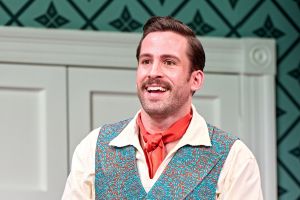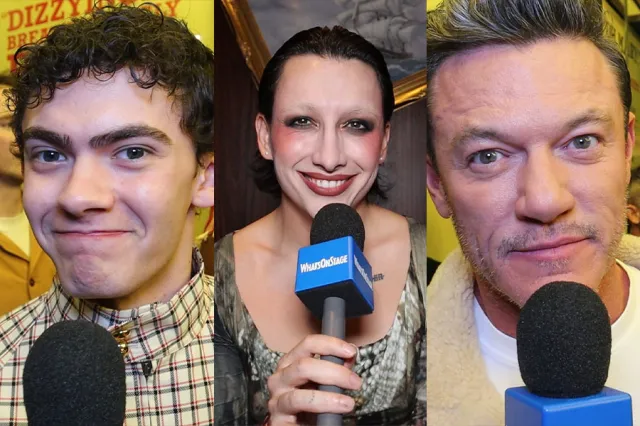20 Questions With…Sian Thomas
Actress Sian Thomas – currently starring in The Price, which transfers to the West End next week – talks about the great Arthur Miller, a life-changing two days’ worth of Faust & being rude to Madonna.
In the late 1970s, soon after drama school, actress Sian Thomas joined the company at the Glasgow Citizens Theatre, under the artistic directorship of Philip Prowse, where she starred in a clutch of classic revivals such as Don Juan, Threepenny Opera, The Caucasian Chalk Circle, Semi Monde and Loot.
Since then, Thomas has been a theatre regular, appearing on major stages in London and around the country. For the Royal Shakespeare Company, she has been seen in The Taming of the Shrew, Happy End, Richard III and King Lear with Nigel Hawthorne, while her many credits at the National Theatre have included The Wandering Jew, Countrymania, The Misanthrope, Square Rounds, Mountain Giants, The Way of the World, Richard II, Sleep with Me and Alan Ayckbourn’s interlinked House and Garden.
Amongst Thomas’ West End credits are The Illusion, Kindertransport, A Delicate Balance, Feelgood and, last year, Up for Grabs, in which she played opposite Madonna in the latter’s West End debut.
On screen, Thomas has been seen in Rose Red, Erik the Viking, Prick Up Your Ears, Vanity Fair, Blindmen, Wide Eyed and Legless, Shadow of the Noose, Stanley and the Women, After the Party, A Mind to Murder as well as crime serials such as The Bill, Taggart and Inspector Morse.
In autumn 2002, Thomas appeared in Sean Holmes’ revival of Arthur Miller’s 1968 classic The Price at London’s Tricycle Theatre, going on to win the Whatsonstage.com Theatregoers’ Choice Award for Best Supporting Actress jointly for her role in that production as well as Up for Grabs.
Thomas and her original co-stars in The Price – Warren Mitchell, Larry Lamb and Des McAleer – are now reprising their roles in a return season at the Tricycle ahead of the production’s transfer later this month to the West End’s Apollo Theatre.
Date & place of birth
Born in Stratford-upon-Avon on 20 September 1953.
Trained at…
Central School of Speech and Drama.
Lives now in…
The Oval in south London.
First big break
I suppose in some ways there were two. To me, my big break was working at Glasgow Citizens Theatre in the late 1970s. It was so thrilling at the time, everyone wanted to work there. I was 22 when I did an audition there and they loved me. I ended up doing about 12 shows with the Citz on and off over two years. Before that, I’d done a year or two in rep and thought, god, is this it? Working at the Citz was like coming into colour from a world of black and white. It really was in its prime then, the middle of a golden age under Philip Prowse. A lot of my close friends today were people I met during that time. We were all on a permanent high, performing amazing parts in European classics and touring all over Europe. I really learnt my stuff there. Not long after that, I was cast as Katherine in The Taming of the Shrew with the RSC, which was a more conventional big break.
Career highlights to date
The one I always think of first is The Misanthrope at the National. That’s where I met the poet Tony Harrison, the man I’ve been living with for the past 14 years. It was a special adaptation of the Molière that Tony wrote 20 years earlier, when it was a huge success, in London and on Broadway, with Diana Rigg and Alec McCowen. The language is gloriously poetic, just yummy, and the character of Celimene, who I played in the revival, is a delicious comic creation but with a dark stain to it.
Playing Hedda Gabler in a production directed by Michael Boyd in the late 1980s was another highlight. The work was totally absorbing and Michael created a wonderful atmosphere. The Illusion, directed by Richard Jones at the Old Vic, was also very special, as is The Price now. This is a wonderful play, wonderful production, wonderful cast and I treasure it.
Favourite co-stars
The boys I’m with now (Warren Mitchell, Des McAleer and Larry Lamb) are all so sweet and, as they’re three of them, they cater for just about every age and taste. Also, Alfred Molina, who was my Petruchio in The Taming of the Shrew. He was like the sun coming out, so warm. Another is John Thaw, who I did two tellies with. I was younger then and John looked after me, he was lovely. And on the film Wide Eyed and Legless, it was heaven working with Julie Walters, Jim Broadbent and Thora Hird. We’d be laughing in the middle of a field in a caravan at five in the morning.
What was it like working with Madonna on Up for Grabs?
I didn’t think I’d enjoy it at all. In fact, I was sure I would regret it – I didn’t think the play was that good, though I could see my part had potential – but it was impossible to turn down the opportunity. All of my scenes were with Madonna on her own so I knew I had to take her on. At first I was nervous. After all, she is probably the most famous person in the world, but I thought, well, she’s coming into my world, the world of theatre acting. I knew I knew more than her and I thought I could help her; that made me feel very strong. But first I had to get to know her and that wasn’t easy. There were a lot of obstacles in the way because of who she is. In many ways, her celebrity has made her very cold. There are frozen little bits of her and you have to hack your way through the ice. The other cast members, all being American, were completely in awe and perhaps overly respectful. They put her up on this pedestal and she couldn’t seem to get off it. So I decided to knock her off by playing my English card and risking a bit. I’d just say ridiculously rude things in front of her like, “This woman simply can’t act. Have you checked Kylie’s availability?” She said, “God, you’re rude”; I said, “Watch this space.” I’d also pretend the whole play was about me and my character. She was bemused, but it worked. We developed this funny, mutually insulting relationship – she’d call me “bitch” – but it was full of affection and lots of laughter. Sometimes I’d give her notes on her performance, too. She had a very low boredom threshold and liked to change her lines a lot. She tried that with me during one performance. As soon as we got offstage, I pulled her aside and told her not to fuck about in my scenes and she never did again. M – we had to call her M – is not really an actress but she is an incredible phenomenon. I managed to engage with her as a democratic equal and, as a consequence, I got to know the person behind all that. She’s very warm and generous. I had a lot of respect for her and I think she respected me to. I would work with her again but it would be depend on the play. Up for Grabs was ultimately a very enjoyable experience.
Favourite directors
Max Stafford-Clark because he’s so clear and he makes you be clear, there’s just no wooliness with Max. Michael Boyd is wonderful, too. He has great depth and vision. His appointment as the RSC’s artistic director is a very good deed in a naughty world. Richard Jones is extraordinary, a true artist, and he makes me laugh. Also Mike Alfreds, who has been a great teacher in my life. He’s taught me more than anyone.
Favourite playwrights
Shakespeare has to be top of the list. You just can’t get around him. Also Ibsen, Strindberg, Harold Pinter and Edward Bond, who sometimes seems to be forgotten about. And for the ‘now’, Mark Ravenhill who is so original. And, of course, Arthur Miller.
In our recent Big Debate poll, Whatsonstage.com theatregoers voted Miller the Greatest Living Playwright by. Do you agree that he deserves this accolade?
Yes, I do. Why? Because of his utter humanity. Miller is so truthful and brave, and he writes about completely real and ordinary people with great compassion. He tackles big moral issues but never becomes portentous. Instead, his plays are always moving, funny and natural. They are never boring, either to do or to watch. He is also an amazingly brave human himself.
What roles would you most like to play still?
Cleopatra in Antony and Cleopatra, Mrs Alving in Ghosts, Madame Arkadina in The Seagull and Louise Rafi in Edward Bond’s The Sea. I’d also love to do Tony Harrison’s Phèdre Brittanica, which is translated from the Racine and, while faithful to the form, presents it in a new way. I’ve always wanted to get a production of that going.
If you hadn’t become an actor, what would you have done professionally?
When I was a little girl, I wanted to be a ballet dancer, but I doubt that would have worked out. I have a secret side that loves drawing and designing so I think – if for some reason acting was barred to me – I could have been a good theatre designer. But really I’m hopeless at anything besides acting. I grew up with actors and knew from the age of nine that’s what I wanted to be so I never really gave myself the option of doing anything else.
What’s the best thing you’ve seen on stage recently?
In England, it was Will Eno‘s The Flu Season, which was directed by Erica Whyman earlier this year at the Gate. It was very quirky and moving, a little jewel. But the thing that still fills my head, even though I saw it a year or two ago, is Peter Stein‘s staging of Faust: Parts I and I, with Bruno Ganz as Faust. The production originated in Germany but I caught it later in Vienna. The two parts had never been done together in their entirety before, and it was an incredible undertaking – 24 hours’ worth of drama, performed in promenade, and spread over 48 hours. And I was there!
What would you advise the government to secure the future of British theatre?
We need much more subsidy, like they have in Germany and France. Otherwise, theatre will become a stranglehold of commercialism. That’s certainly the case in the West End, but it filters through to our subsidised theatres too, which should be much more about experimentation. But because the money’s not there, everything’s so tight so everybody plays it safe. Something like Stein’s Faust was absolutely life-changing. I’ll remember the experience forever. But I had to go to Vienna to see it. It could never have happened in this country because our theatre has become too market-driven.
If you could swap places with one person (living or dead) for a day, who would it be?
There are two different people I’d choose because I hugely admire them, though I don’t know what the reality of their lives would be like. The first is Maria Callas. I think being an opera singer is the greatest thing you could do and she was the greatest of them all. She had a quite sad life, though, didn’t she? So maybe I’d be her on the day she opened Tosca at La Scala or something. Also, I’d love to be Rembrandt for a day, just to see the world the way he saw it.
Favourite books
I love all of Dostoyevsky’s work. I also like Gabriel Garcia Marquez and Doris Lessing. Maybe because I live with a poet, I also tend to read a lot of poetry. If I were on a desert island, I’d have to have a book of Tony’s poems with me, as well as some of the Romantics – Shelley and Keats – and some Lorca, who was a wonderful theatrical poet, something quite rare.
Favourite holiday destinations
Delphi in Greece. It’s halfway up Mt Parnassus and was the bellybutton of the ancient world. It’s a very spiritual place and the people are sweet. They love you if you try to speak Greek. I speak a little and Tony is fluent in both ancient and modern Greek. Also, on the coast nearby is Galaxidi, which is great for fishing and swimming. I also try to go to Italy as often as I can, especially Naples.
Favourite after-show haunts
When I can afford it, I like Sheekey’s or Orso’s.
Why did you want to accept the role of Esther in this production of The Price?
Why you do a production almost always comes down to the play more than anything. When I first read The Price, I thought Esther was a little underwritten, that maybe she wasn’t as important a part as the brothers, but now I can’t believe I thought that. It’s such an ensemble piece and she’s a vital ingredient to the mix.
What’s it like returning to the production after a hiatus?
When we stopped before, it felt like the show was being cut off in its prime. This time around, we had only a week to re-rehearse it, but I think it must have been still cooking away in our sub-consciences during the nine-month break. The first performance back in front of the Tricycle audience, we all got very nervous. There was a danger of tensing up, but at the same time, the old pro inside knew the material so well and was monitoring everything. It was a real mix of nerves and absolute assuredness. For me, it suddenly felt like Esther got more real, like she had gravity boots on she was so rooted. It’s been like that, and getting better, ever since. It’s like the piece knows it’s alive and it’s growing, shooting off new little blossoms every night. It’s a very rare privilege to be able to have another go at something so wonderful and we’re all enjoying it. And the trust and generosity that has built up between us through that process has been very genuine and very moving.
What’s your favourite line from The Price?
I can’t think of a favourite line but I do have a favourite stage direction, which I presume was Miller’s. It’s at the end of the play after Esther’s last line, when she’s lost all her illusions but come back from the brink. The direction is: “Esther walks to the door with her life”. It’s the most extraordinary stage direction I’ve ever read. I mean, how do you act that?
What’s the funniest thing that’s happened during the run to date of The Price?
Warren has us in stitches every night. There’s a scene where he peels a boiled egg. He takes quite a few minutes to do it – which is more Mitchell than Miller I think – but he’s so funny he can sustain it. One night, he couldn’t get the shell off and he started ad-libbing with the audience, asking people whether they’d read any good books lately. If it had been me, I probably would have been thrown, but he has this ability step outside and keep inside the reality of the play at the same time. He’s so entertaining. The cast always meet up at the interval for endless chocolate biscuits, tea and stories from Warren’s past.
What are your plans for the future?
We’re all looking forward to taking The Price into the West End, though the Apollo will be very different after the intimacy of the Tricycle. I do hope people will come to see us there. Then, next year, I’m returning to the RSC in Stratford to play Lady Macbeth for Dominic Cooke and also Gertrude in Michael Boyd‘s production of Hamlet.
– Sian Thomas was speaking to Terri Paddock
Following the conclusion of its limited return season at north London’s Tricycle Theatre on 6 September, The Price transfers to the West End’s Apollo Theatre, where it reopens on 11 September 2003, following previews from 9 September.
DON’T MISS our Whatsonstage.com Outing to THE PRICE on Wednesday 24 September 2003 – including a FREE drink & an opportunity to meet Sian Thomas & her co-stars – all for only £22.50!! Click here to BOOK NOW!












